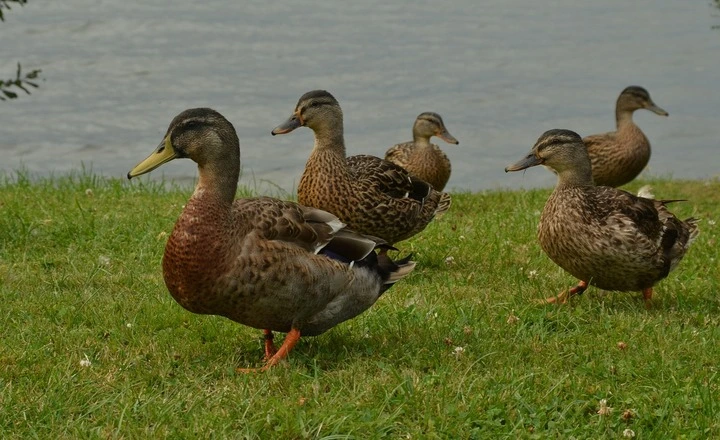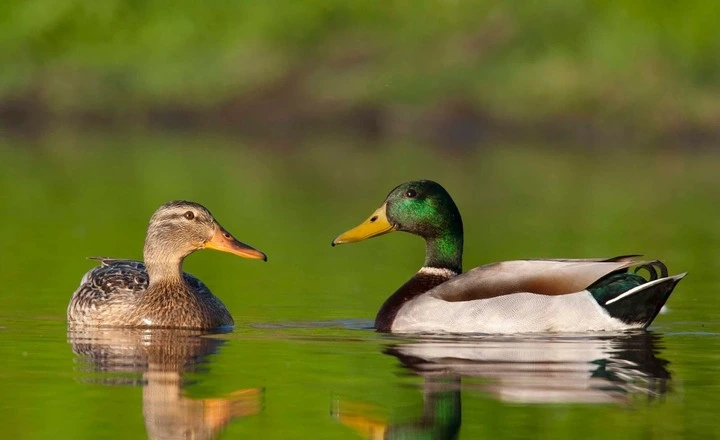Have you ever watched a duck gracefully glide across a pond, seemingly effortlessly diving beneath the shimmering surface without a second thought? It’s a mesmerizing sight, leaving many of us wondering that How Long Can Ducks Hold their Breath?
Ducks are known for their remarkable swimming abilities and adeptness at diving underwater in search of food. But what lies beneath the surface of their breath-holding capabilities remains a mystery to most.
How Long Can Ducks Hold Their Breath?
Ducks are remarkable swimmers and have the ability to hold their breath underwater for varying lengths of time, depending on the breed.
Most duck breeds can hold their breath for up to 50 seconds, which allows them to dive and forage for food underwater efficiently. There are a few duck breeds that can only hold their breath for about 20 to 30 minutes before needing to resurface.
It’s important to note that while ducks have impressive breath-holding capabilities, they are not able to stay submerged indefinitely. The duration for which a duck can hold its breath is influenced by factors such as the breed, age, and overall health of the individual bird.
Breath in Water
They have varying abilities when it comes to holding their breath underwater. Different duck species have adapted to different diving capabilities, with some able to hold their breath for longer periods than others.
Diver ducks, such as the Barrows Goldeneye and Hooded Merganser, are known for their impressive ability to hold their breath for up to a minute or more.
These ducks have specialized adaptations that allow them to store more oxygen in their lungs and distribute it efficiently throughout their bodies while diving.
Dabbling ducks like the Mallard or Pintail may only be able to hold their breath for shorter durations, typically around 20-50 seconds.
Their diving behavior is not as extensive as that of diver ducks, so they do not require the same level of oxygen storage capacity.
Each duck species has evolved unique physiological traits that enable them to thrive in their respective habitats and fulfill their specific feeding and survival needs.
All Claims are False
The claim that female ducks die in the breeding season due to male ducks burying their heads in water for over 50 seconds is not accurate.
While it is true that ducks need to come up for air periodically, they are capable of holding their breath for longer than 50 seconds.

Ducks have evolved to be able to stay submerged for extended periods while foraging underwater, so the notion that they can only hold their breath for a short amount of time is incorrect.
It is important to fact-check information before believing and spreading it. The claim about ducks not being able to hold their breath for more than 50 seconds is simply false.
Ducks Do Not Dive In The Water For More Than 10 Seconds
Ducks are not built for long periods of underwater diving like other aquatic animals such as seals or whales. Their physiology is adapted for quick, shallow dives to forage for food rather than prolonged stays underwater.
Ducks have a unique anatomical structure that allows them to trap air in their feathers which helps with buoyancy and insulation, but limits their ability to stay submerged for extended periods.
The short duration of dives also helps ducks avoid predators and conserve energy. By quickly diving and resurfacing, they can efficiently search for food while minimizing the risk of being caught by predators lurking beneath the surface.
How Fast Can Ducks Swim Underwater?
Ducks are known to swim at speeds of around 6 mph, which suggests that they are likely able to move swiftly underwater as well.
Observations of ducks resurfacing several feet away from where they entered the water indicate their agility and speed in navigating underwater environments.
Certain duck species, such as long-tailed ducks, have been documented resurfacing over 30 feet from their diving point, showcasing their remarkable ability to cover distances quickly underwater.
This suggests that ducks possess efficient swimming techniques that enable them to maneuver rapidly beneath the surface.
While precise measurements may be lacking, anecdotal evidence and observations highlight the impressive underwater swimming capabilities of these avian creatures.
How Deep Can Ducks Dive?
Ducks are known for their diving abilities, with most species typically sticking to depths of around 6 to 10 feet underwater.
Some diving ducks can go much deeper than that. Long-tailed ducks and mergansers have been observed diving to impressive depths of over 40 feet.

The Common eider holds the title for the deepest diving duck, capable of reaching depths of approximately 60 to 65 feet, which is equivalent to about 20 to 25 meters.
These diving capabilities are essential for ducks as they search for food underwater, such as aquatic plants, insects, and small fish.
Why Can Ducks Stay Underwater For So Long?
Ducks are able to stay underwater for extended periods due to a combination of physical adaptations and physiological capabilities.
Their buoyant bodies, smooth feathers, and webbed feet make them well-suited for life on the water, allowing them to move swiftly both underwater and on the surface. Diving ducks, in particular, have compact wings that enable them to dive quickly and efficiently.

They have a circulatory system that functions effectively with low oxygen levels, giving them the ability to hold their breath longer than many other bird species.
This high tolerance for asphyxia allows diving ducks to remain submerged for extended periods while they search for food.
While ducks are impressive divers in their own right, they are surpassed by penguins in terms of breath-holding capabilities, with some penguin species capable of staying underwater for over 30 minutes at a time.
Conclusion
Ducks are impressive swimmers that have adapted to hold their breath underwater for extended periods of time. Through a combination of physiological adaptations and instinctual behavior, ducks can stay submerged for up to several minutes while foraging or escaping predators.
The ability to hold their breath is crucial for their survival in their aquatic habitats. Understanding the mechanisms behind this remarkable feat sheds light on the fascinating world of waterfowl biology and highlights the importance of protecting their natural environments.
FAQs
Can ducks hear underwater?
Ducks have a unique ability to hear both above and below the water’s surface. While they may not hear as clearly underwater as they do on land, ducks have specialized ear structures that allow them to detect sound vibrations in the water.
What color do ducks see?
Ducks have ability to see colors differently than humans do. They can see a wider spectrum of colors, including ultraviolet light, which is invisible to the human eye.
Do duck have teeth?
Ducks do not have teeth in the traditional sense. Instead, they have serrations or ridges along the edges of their bills that help them grip and filter their food.
